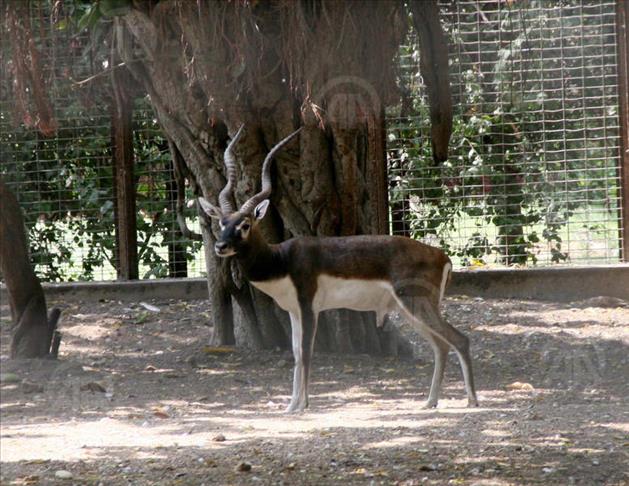
"Ten to 12 years ago, hundreds of black deer would straggle along the border areas with India," Ashraf, a local landlord, told Anadolu Agency. "But with extensive hunting, mainly by Arab hunters, the species is on the verge of extinction."
Ashraf and his father, who is also a blackbuck aficionado, have devoted a great deal of time – and indeed a good deal of money – to the preservation of the rare species.
They have dedicated 80 acres of land in the desert area of Saleh Putt in the Sukkur district, some 500km northeast of Karachi and only 35km from the Indian border, as a natural reserve for blackbucks.
"We began with 200 blackbucks some eight years ago that we found in the locality," Ashraf recalled, adding proudly: "It has taken us eight years to raise the number of blackbucks to 60."
Current estimates suggest that there are between 100 and 150 blackbucks in the country's eastern desert areas, of which about 60 are thought to inhabit the Bhanbros' land.
The others are said to be protected by a pair of other local landlords, who have also earmarked some of their land as a refuge for the beautiful animals.
Blackbucks are native to Pakistan and India but considered extinct in neighboring Bangladesh.
Pakistan's eastern and western deserts, along with its northern mountains, were the blackbucks' original habitat.
- Arab hunters
Ashraf and his father not only protect the black deer from hunters, but they also buy any blackbucks they find for sale and set them free on their sprawling farm.
"If someone along the border has a blackbuck, I immediately approach him to buy it," Samoon, the father, told AA.
He said that one black deer was currently sold for between Rs 100,000 and 200,000 (between roughly $1000 and $2000) – a price that encourages many locals to hunt the rare animals.
"It costs me a lot, but this is the only way to protect them," Samoon said.
"I never sell them. They are like my children," he added passionately. "They are the real beauty of our deserts, which unfortunately are near extinction."
He mainly blames wealthy Arab hunters for the gradual disappearance of blackbucks from the country's eastern border.
"They [Arab hunters] come here at the invitation of our government as state guests to hunt the blackbucks," he said.
"How can I stop them?" Samoon asked rhetorically, accusing the state-run Wildlife Department of issuing hunting permits to members of royal families from different Gulf countries, especially the United Arab Emirates.
Arab royals frequently visit Pakistan –in both winter and summer – at the invitation of local politicians and government officials who arrange special hunting safaris for them.
In winter, they hunt migratory Siberian birds that fly through Pakistan, while in summer, deer and various mountain species are the preferred quarry.
Samoon recalled how in 1999 he had challenged a convoy of Arab hunters who had trespassed onto his land to hunt black deer.
When he saw government officials and the hunters' hunting permits, however, he backed off.
"They are powerful people. I could not do anything to stop them," Samoon conceded.
"But I decided to protect our beauty, which I have been doing," he said, noting that Arab hunters had stopped coming to his land for the last three years because "nothing is left for them here."
Hussein Bux Bhagat, chief conservator at the state-run Wildlife Department, says that blackbucks are not totally extinct.
"They are very much in different captive places in the hundreds," he told AA. "But they are no more in deserts and open woods."
Bhagat blames human encroachment and rising populations in desert areas for the destruction of the animals' native habitat and the plants that used to meet their water and food needs.
The official also blames local hunters, not wealthy Arab visitors, for the gradual extinction of the wild species.
"Only 30 to 40 hunting licenses are issued yearly to Arab hunters by the federal government through the foreign ministry," he told AA.
"But these licenses are meant for hunting bustards rather than blackbucks, because there are no more blackbucks in deserts and woods," Bhagat added.
"It's the local hunters," he went on to assert, "who are actually responsible for the elimination of black deer in Pakistan."
By Aamir Latif – Anadolu Agency
englishnews@aa.com.tr


